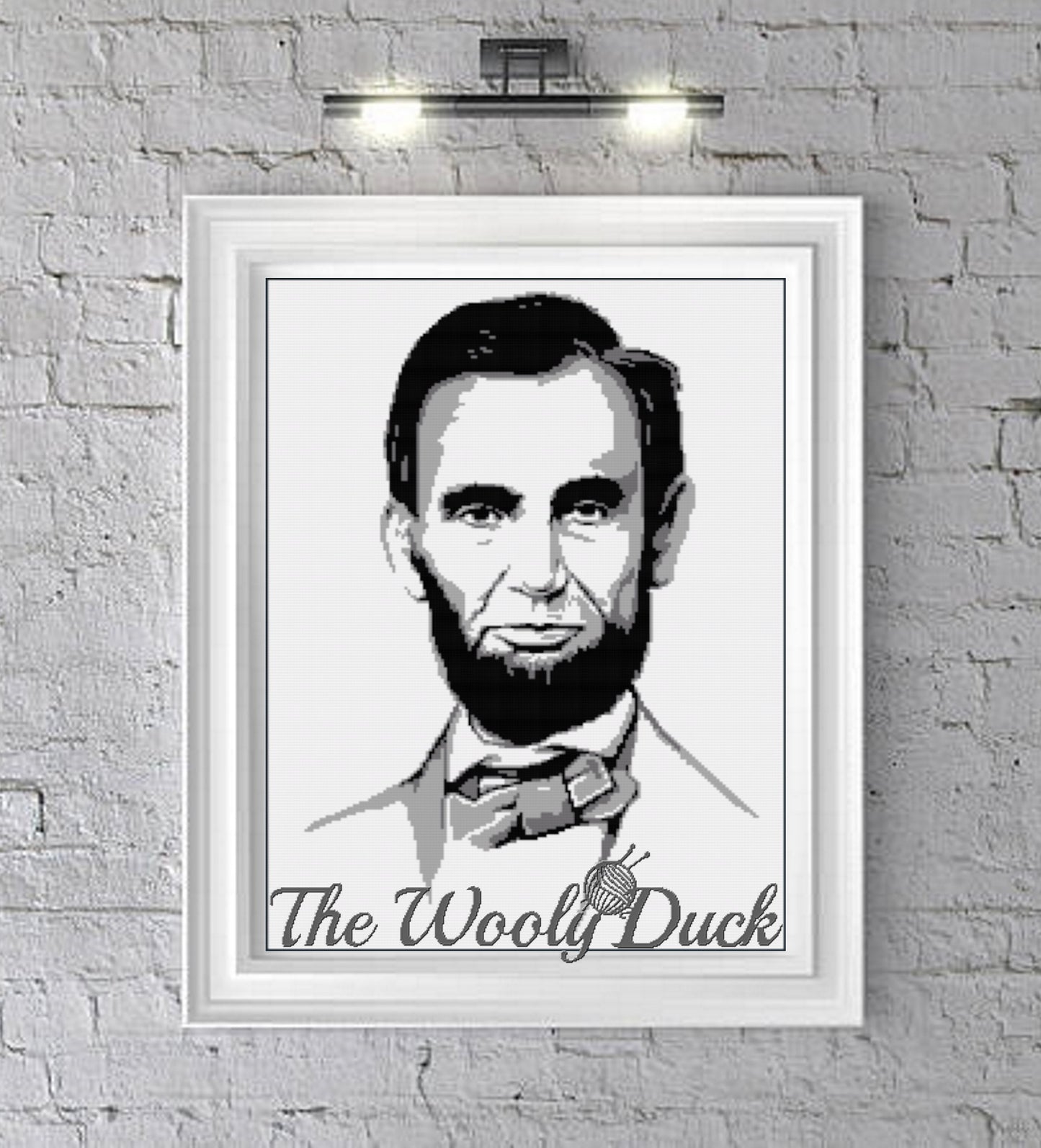The Wooly Duck
President Abraham Lincoln crochet graphghan pattern for sc
President Abraham Lincoln crochet graphghan pattern for sc
Couldn't load pickup availability
This is a digital download of a graphghan pattern of President Abraham Lincoln ,for single crochet/cross stitch/ diamond painting pattern.
The pattern comes with written line by line instructions as well as a graph and an additional cross stitch file can be obtained free of charge if needed, just send me a note with the purchase..
The final stitch count is provided, as well as Yarn Brand and an estimated amount of it needed .The instructions are for right handed but if you're left handed you can add an extra row at the beginning of your work so row 1 in the pattern will be your row 2, row 2 in the pattern will be your row 3 etc ( or you can read the rows backwards)
Size 170 stitches x 240 rows using 4 colours
The finished size of the graphghan will vary depending on the hook size and yarn. But the size is estimated for an adult throw size blanket with an average 4sc x 5 rows = 1 inch square
This listing is for pattern only- not a finished graphghan.
Pattern Copyright ©2019 The Wooly Duck
***"Copyright includes PATTERN AND THE ORIGINAL ARTWORK. Please do not sell, change, share a copy or reproduce in any way. All photos are also copyright protected and may not be used unless I give you written permission.
All of my digital patterns are intended for personal , non-commercial use only'
By purchasing these patterns you agree to the terms above.
Trivia
Abraham Lincoln ( February 12, 1809 – April 15, 1865) was an American statesman and lawyer who served as the 16th president of the United States from March 1861 until his assassination in April 1865. Lincoln led the nation through the American Civil War, its bloodiest war and its greatest moral, constitutional, and political crisis. He preserved the Union, abolished slavery, strengthened the federal government, and modernized the U.S. economy. Born in a log cabin, Lincoln grew up on the frontier (mainly in Spencer County, Indiana) in a poor family. Self-educated, he became a lawyer, Whig Party leader, Illinois state legislator and U.S. Congressman from Illinois. In 1849, he left government to resume his law practice, but angered by the Kansas–Nebraska Act's opening of the prairie lands to slavery, reentered politics in 1854. He became a leader in the new Republican Party and gained national attention in the 1858 debates against national Democratic leader Stephen Douglas in the U.S Senate campaign in Illinois. He then ran for President in 1860, sweeping the North and winning. Southern pro-slavery elements took his win as proof that the North was rejecting the constitutional rights of Southern states to practice slavery. They began the process of seceding from the union. To secure its independence, the new Confederate States of America fired on Fort Sumter, one of the few U.S. forts in the South. Lincoln called up volunteers and militia to suppress the rebellion and restore the Union. As the leader of the moderate faction of the Republican Party, Lincoln confronted Radical Republicans, who demanded harsher treatment of the South; War Democrats, who rallied a large faction of former opponents into his camp; anti-war Democrats (called Copperheads), who despised him; and irreconcilable secessionists, who plotted his assassination. Lincoln fought the factions by pitting them against each other, by carefully distributing political patronage, and by appealing to the American people. His Gettysburg Address became an iconic call for nationalism, republicanism, equal rights, liberty, and democracy. He suspended habeas corpus, and he averted British intervention by defusing the Trent Affair. Lincoln closely supervised the war effort, including the selection of generals and the naval blockade that shut down the South's trade. As the war progressed, he manoeuvred to end slavery, issuing the Emancipation Proclamation of 1863; ordering the Army to protect escaped slaves, encouraging border states to outlaw slavery, and pushing through Congress the Thirteenth Amendment to the United States Constitution, which outlawed slavery across the country. Lincoln managed his own re-election campaign. He sought to reconcile his damaged nation by avoiding retribution against the secessionists. A few days after the Battle of Appomattox Court House, he was shot by John Wilkes Booth, an actor and Confederate sympathizer, on April 14, 1865, and died the following day. Abraham Lincoln is remembered as the United States' martyr hero. He is consistently ranked both by scholars and the public as among the greatest U.S. presidents.
Share




